Many years ago, at JFK airport, after returning from abroad, I was stopped by a Customs and Border Patrol agent, who inquired about the purpose of my trip, and then followed up by asking what my profession is. When I told him I was a reporter, he accused me of purposely putting out negative misinformation about law enforcement.
At first, I thought it was a joke, but his seriousness grew, as did my fear of being detained. I mentioned the name of his union president, who I knew, since one of my beats is organized labor. He let me go.
I’ve thought a lot about this exchange since President Donald Trump has amped up his campaign against the American press, claiming any unfavorable items about him is “fake news.” While Trump’s accusations of the press being the people’s enemy, as he called it, has garnered attention, it’s far more troubling that a great many of his supporters not only actively believe that journalists are enemy agents but that they choose to get their news directly from the president, as if in the name of liberty these cheering patriots are feverishly building their own Orwellian dystopia.
In the age of the Internet, it’s far easier than it was a generation ago to pick and choose information that conforms with one’s own biases, and dismiss discomforting news by disregarding its source as being hopelessly partisan. And with hometown newspapers in mid-sized cities losing their circulations and local prominence, the existing mainstream media are, in fact, behemoth organizations usually based in New York or Washington DC.
The right’s distrust of mainstream media isn’t new. Conservative pundits had a similar line during the Bush/Cheney years, dismissing dissent as manufactured propaganda by coastal elites whose effete cosmopolitanism made them out touch with “real” America. But even George W. Bush had the support of plenty of editorial boards and knew how to use the press when he needed to, even using the liberal New York Times to help sell the lie that Iraq had nuclear capabilities.
The rejection of media’s entire legitimacy is a shift from mere Republican deflection to an embrace of autocracy. Trump supporters even shouted the Nazi slogan lügenpresse (“lying press”) at reporters during campaign rallies. It’s a decision to unshackle oneself from modern and enlightened dialectic thought and only receive direction from their leader.
Americans love to tout their liberty, but like any human we’re as willing to be ruled as anyone else–as long as basic needs are met and crime is down, a great many people would rather not have to think about the big ideas of the day.
Part of this comes an especially dark place. It’s not hard to see that the accusation that media organizations are subversive organizations in New York or Los Angeles seeking to confront American exceptionalism as a veiled version of the anti-Semitic canard that Jews control the media, and it’s all the more transparent since Trump has the support of many white supremacist and neo-Nazi groups.
But it’s also an indication of the religious fervor of the Trump movement. There’s artwork that depicts his executive orders being guided by Jesus Christ, and having picked a right-wing Christian his vice president, he has sent the message this his administration will be a partisan in the culture wars against secular liberals. And like how American Protestantism eschews having an intermediary between man and God like one does in Catholicism, Trump supporters seeks an unfiltered relationship with their leader.
This won’t kill the American press. In fact, it might could make it more adversarial to the regime, and unlike any other nation, the United States has a constitutional guarantee of a free press. But it does mean that a large part of the voting public has ended debate with anyone on the outside. The discussion is over for them, they aren’t interested in looking over the issues, the facts, and seeing what the solutions to problems could be.
What that means is that the push back against the press and those who use free media to be informed about the government will get all the more angrier and violent journalists and free thinkers are no longer just people with a different point of view for heretics hell-bent on an ungodly mission. This is what makes the Trump movement, unlike any other popular right-wing movement in recent American memory, more fascistic than anything else.
Screenshots courtesy of RobHoAd. Published under a Creative Commons license.







